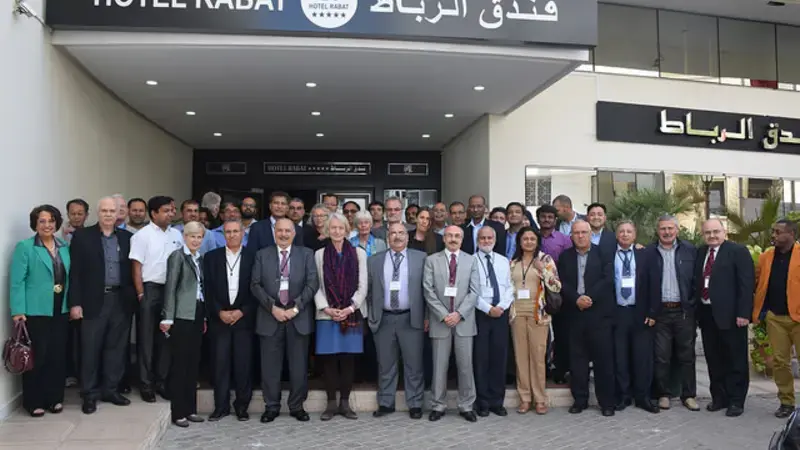Impacts on ground highlight partnerships and responsive research
Published Date
May 12, 2015

ICARDA's Board of Trustees meeting was held in Rabat, Morocco, from May 3-6, 2015.
Research updates at ICARDA’s 56th Board of Trustees Meeting, held May 3-6, 2015, brought forth the pivotal role played by partnerships and responsive research agendas in delivering impacts on ground –both practices have proven to be the pillars of the Center’s strategy. Demonstrative of their importance for ICARDA, the Board of Trustees meeting was organized in Rabat, Morocco, where ICARDA is collaborating with the national agricultural research center, INRA, to develop technologies for sustainably increasing agricultural productivity in dry areas.
“Intensification and diversification of rainfed systems is perhaps the biggest pathway to increase food security in dry areas,” said Mahmoud Solh, Director General of ICARDA at the opening of the board meeting. Leveraging Morocco’s high potential agroecoystems, ICARDA has established a research platform in the country for developing suitable technologies for sustainable intensification. The platform’s research agenda is directly responding to the global dryland challenges of food security, sustainable natural resource management and farmer livelihoods, while also contributing to Morocco’s national goals of ramping up its agriculture sector.
The biannual research update to the board highlighted several significant impacts and progress accomplished by ICARDA’s scientists, working together with national programs, advanced research institutes and other CGIAR centers.
A new model for systems partnerships is being demonstrated and tested under the ICARDA-led CGIAR Research Program on Dryland Systems, through 45 innovation platforms. Implemented across dry areas in Asia and Africa, these platforms engage with diverse stakeholders to deliver technologies, practices, institutions and policies to improve agricultural livelihoods. In parallel, the program has put in place a robust framework for monitoring and evaluation, crosscutting workgroups, and geo-informatics – gearing up the program to meet its ambitious targets of food and nutrition security and reduced poverty, The program is moving forward with 13 action sites, one of them in Morocco, focusing on rainfed livelihood systems.
In South Asia, a partnership with national and regional research institutions and extension in Nepal, Bangladesh and India has scaled out lentil technologies to over 1.8 million farmers in the region. The higher yields from improved varieties and production technologies are bringing in an extra $29-30 million annually in Bangladesh and Nepal. The most valuable impact, perhaps, is from the higher zinc and iron content of the improved varieties, which are significantly improving the daily nutrition for poor farmer families – a major development challenge in the region. These outputs are also supporting the global mission of the CGIAR’s Research Program on Grain Legumes.
In Sub-Saharan Africa, ICARDA’s partnership with the NARS in Ethiopia on small ruminant research is bearing fruit in the form of a community based sheep breeding program. This first-time-ever standardized and structured approach to selective breeding is a milestone development for rural livelihoods in marginal areas where small ruminants play a critical role in building resilience. These activities and outputs are directly contributing to the CGIAR Research Program on Livestock & Fish.
Teaming up with the International Maize and Wheat Improvement Center (CIMMYT), ICARDA is also contributing to the CGIAR Research Program on Wheat to feed a growing population against a backdrop of climate change. Hans Braun, Director of the research program, highlighted the complementarities between the two centers and their mutual role in accelerating technologies for the future.
The Board of Trustees meeting identified new synergies and opportunities that could further increase returns from ICARDA’s research programs – a continual objective driving the Center’s research agenda and partnerships.
To see images from ICARDA’s Board of Trustees meeting click here
